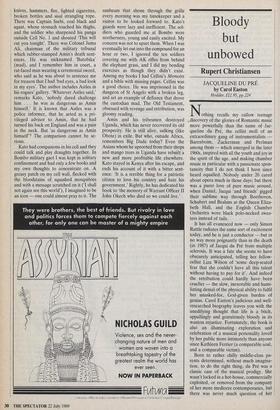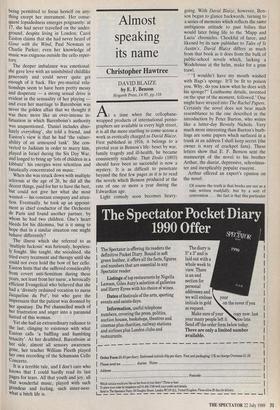Bloody but unbowed
Rupert Christiansen
JACQUELINE DU PRE by Carol Easton Hodder, £12.95, pp.224 N othing recalls my callow teenage • , discovery of the glories of Romantic music more powerfully than the name of Jac- queline du Pre, the cellist moll of an extraordinary gang of instrumentalists — Barenboim, Zuckerman and Perlman among them — which emerged in the later 1960s, inspired with all the youth and joy in the spirit of the age, and making chamber music in particular with a passionate spon- taneity that I do not think I have since heard equalled. Nobody under 20 cared about opera much in those days; but there was a purer love of pure music around, when Daniel, Jacqui 'and friends' gigged their sublime way through Beethoven, Schubert and Brahms at the Queen Eliza- beth Hall, and the English Chamber Orchestra wore black polo-necked swea- ters instead of tails.
It has all evanesced now — only Simon Rattle radiates the same sort of excitement today, and he is just a conductor — but in no way more poignantly than in the death (in 1987) of. Jacqui du Pre from multiple sclerosis. It was a fate she seems to have obscurely anticipated, telling her fellow- cellist Liza Wilson of 'some deep-seated fear that she couldn't have all this talent without having to pay for it'. And indeed the retribution could hardly have been crueller — the slow, inexorable and humi- liating denial of the physical ability to fulfil her unasked-for, God-given burden of genius. Carol Easton's judicious and well- researched biography leaves you with the unedifying thought that life is a bitch, appallingly and gratuitously bloody in its wanton injustice. Fortunately, the book is also an illuminating exploration and celebration of a musical personality loved by her public more intimately than anyone since Kathleen Ferrier (a comparable soul, and a comparable victim).
Born to rather chilly middle-class pa- rents determined, without much imagina- tion, to do the right thing, du Pre was a classic case of the musical prodigy. She wasn't locked in a hot-house, commercially exploited, or removed from the company of her more mediocre contemporaries, but there was never much question of her being permitted to focus herself on any- thing except her instrument. Her conse- quent lopsidedness emerges poignantly: at 17, she had never travelled on the under- ground, despite living in London; Carol Easton claims that she had never heard of Gone with the Wind, Paul Newman or Charlie Parker; even her knowledge of music was exiguous outside the cello reper- tory.
The deeper imbalance was emotional: she gave love with an uninhibited childlike generosity and could never quite get enough of it back. Her pre-marital rela- tionships seem to have been pretty messy and desperate — a strong sexual drive is evident in the sensuality of her playing and even her marriage to Barenboim was never the golden affair that we thought it was then: more like an over-intense in- fatuation in which Barenboim's authority was unquestioned. 'Daniel includes abso- lutely everything', she told a friend, and Easton's view is that he had 'the vulner- ability of an armoured tank'. She con- verted to Judaism in order to marry him, played in Israel during the Six Day War, and longed to bring up 'lots of children in a kibbutz': his energies were relentless and fanatically concentrated on music.
When she was struck down with multiple sclerosis at the age of 26, he did all the decent things, paid for her to have the best, but could not give her what she most wanted — his constant company and atten- tion. Eventually, he took up an appoint- ment as chief conductor of the Orchestre de Paris and found another partner, by whom he had two children. One's heart bleeds for his dilemma, but is it smug to hope that in a similar situation one might behave differently?
The illness which she referred to as `multiple fuckosis' was furiously, hopeless- ly fought. She taught, she socialised, she tried every treatment and therapy until she could not even hold the bow of her cello. Easton hints that she suffered considerably from covert anti-Semitism during these years, not least from her nurse, a heroically efficient Evangelical who believed that she had a 'divinely ordained vocation to nurse Jacqueline du Pre', but who gave the impression that the patient was doomed by her apostasy. Du Pre channelled much of her frustration and anger into a paranoid hatred of this woman.
Yet she had an extraordinary radiance to the last, clinging to existence with what Easton calls 'a baffling and humbling tenacity'. At her deathbed, Barenboim at her side, almost all sensory awareness gone, her teacher William Pleeth played her own recording of the Schumann Cello Concerto.
It is a terrible tale, and I don't care who knows that I could hardly read its last Pages for tears. All that youth and joy, all that wonderful music, played with such grandeur and feeling, such inner-ness: what a bitch life is.



















































 Previous page
Previous page